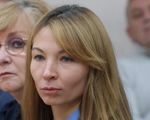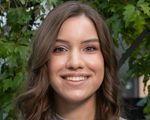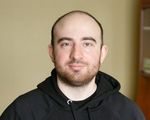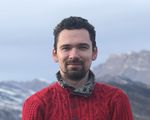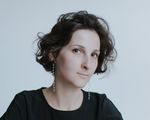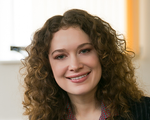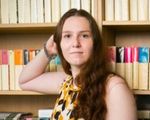About Success Builder
How do you find your place in life? How do you find something to do that both comes naturally to you and makes you happy? The answer is that you have to apply the knowledge you’ve gained from university and from life itself correctly. The Success Builder Project features HSE University graduates who have discovered themselves through an interesting business or an unexpected profession. The protagonists share their experiences and lessons learnt and talk about how they’ve made the most of the opportunities they were given.
Ekaterina Mikhailova graduated from HSE University’s Political Science programme in 2019 and is convinced that the knowledge she gained is relevant to the challenges of modern business. She currently holds the position of Head of Strategic Development at Changellenge. In this interview, she spoke about what political scientists do at HSE University, how HR professionals respond when they have doubts about an applicant, and what soft skills are needed to successfully pass an interview.
Why did you apply to the Political Science programme?
I graduated from high school in Podolsk. It was a preparatory school with an economic focus. I could choose between physics & math, chemistry & biology, or economics, so I chose the latter. Starting in the eighth grade, I became interested in social studies and the humanities, and then in Russia’s domestic affairs. As a result, it wasn’t really a choice as to whether I’d be a techie or in the humanities. As I got closer to the 11th grade, the question arose of where I would study. I had always known that I should go to a top university in Moscow.
My homeroom teacher in school, who taught economics, was the one who told me about HSE University. She said, ‘I know you. This is the place for you.’ It was love at first sight with HSE, from the moment I began the application process. At that time, people could apply to up to five universities. I never wanted to attend Moscow State University; it seemed too conservative. I remember that we also looked at the Financial Academy, RUDN University and the Russian State Humanitarian University as backup options. We came to the HSE campus at Myasnitskaya Street and something just clicked at that moment; as soon as I submitted my documents, I realised there was really only one option for me. Having an electronic queue after the five-hour-long physical queue at RANEPA was out of this world and, in general, the atmosphere of the HSE campus on Myasnitskaya really hooked me.
Why political science? I have always felt that higher education should be truly interesting. I don’t want to attend classes for four years just to say I did it. Even though my parents are both pharmacists and have been working in their professions all their lives, there was no generally held belief in our family that you should go to college simply because ‘education is useful.’ None of us thought about the university from the point of view of career. Instead, we wanted our studies to give us an answer to the question of how everything works in the world and how to live life in general. Of everything available, I really liked political science a lot because it seemed vital and relevant and like it could provide the best grounding in terms of worldview and the formation of a frame of reference in general. It includes philosophy, political theory, and sociology, and all of this resonated with me. At the Open House, I was impressed by the talk given by Andrei Melville, and the teachers tried to honestly convey their beliefs to the incoming students. It was great. The four years of education I received fully met, and even exceeded my expectations.
What was interesting about the programme once you were actually there?
My impressions of my studies changed from one year to the next. The first two years were extremely challenging. I studied with people who had won Academic Olympics competitions and graduated from the HSE University preparatory programme. They were more capable than the average student and it was tough to compete with them. I still remember the words of Mikhail Mironyuk, who was the programme’s science director at the time. It was August 31, the first day we came together before classes began, and he said, ‘If you think this is going to be easy, then you’ve made the wrong choice.’ I tried to remember these words through the next four years of headaches with homework, classes, and endless political sciences terms.
I really liked the attitude teachers had towards first-year students. The first thing we heard in class was, ‘Good afternoon, colleagues.’ You immediately saw yourself in a completely different way and you tried to live up to that.
The feeling that you are on a par with top-level experts is imaginary, but it gives you a completely different attitude towards the information that you have to learn
Another important thing that inspired me was the freedom and the help you received from all quarters in developing your critical thinking. Nobody tried to force their opinion on you. Nobody told you what was right or wrong. You were given introductory tools for analysis and were expected to draw conclusions yourself. All these features of HSE University and, specifically, the programmes there, have become the most important for me in my life.
How do you rate the programme in terms of applied knowledge?
With regard to my background, my experience is very interesting: as a third-year student, I was a candidate for municipal deputy, which coincided with my interest in politics. Political science is not politics, but it was very interesting to try to understand how what we are told about in political technologies classes actually works. All sorts of internships also helped in this—in political consulting and research projects with foreign universities.
Because this programme is part of the humanities, the emphasis is on soft skills, which make you a competitive candidate in the labour market. If, in the first two blocks of classes, you didn’t learn how to collect and analyse information, critical thinking, and working with sources, then you simply wouldn’t survive the flood of tasks that followed. The most important skill of political science students is the ability to defend their point of view and express their thoughts. Because this is part of the humanities, it constantly leads you to being an excellent communicator, which is very important in a career.
It is equally important to be able to overcome difficulties all the time, which is characteristic of of how HSE University students are trained. You constantly need to learn something new, be able to cope with a million deadlines in one week, learn to structure yourself and overcome your limitations. All of this is an integral part of your life.
In terms of hard skills, from the outside the bachelor’s programme in Political Science seems like it is purely part of the humanities, but this is not the case. When I was a student, we were divided into two tracks—political management and political analysis. Starting in the second year, we had very difficult courses in mathematics, probability theory, mathematical statistics, and programming in Python. All this was tied to qualitative and quantitative research, with the latter extremely challenging in terms of methods. Now I see that this is necessary for anyone doing business analysis and research for a company, whether sociological, marketing-related, and so on. As a specialist responsible for the strategic development of the business, what is most important to me now is the ability to isolate and collect data according to the methodology and to understand what representative data is. What’s more, I am now doing projects to create an employer brand for companies. We are also developing EVPs, which require both research skills and creativity. As a rule, the research is built entirely on a sociological foundation that was laid for me in my studies of political science.
Did your first attempts at starting a career linked in some way to your education?
I began working during my second year of studies, first in a research project conducted by a graduate of the programme who had left to get a PhD at an American university. I was an apprentice researcher there. Interestingly, this was sociological research. After that, I worked in political consulting, and also worked on research projects at the Agency for Strategic Initiatives. In my third year, I also wrote articles as a journalist for HSE media. In short, I tried my hand at everything I found interesting to get a feel for what I would like to do in the future.
I soon found an internship in the recruitment department of Renault, and have since moved to HR. I joined Changellenge in my third year and, until recently, dealt with HR tasks there. On the one hand, I did a lot in terms of HR analytics, which is essentially a research methodology and working with data. On the other hand, since I had a background in qualitative research, I conducted in-depth interviews and conducted focus groups with employees, which helped me to do some important internal projects for our company (for example, create new values and launch internal corporate media) and make a lot of progress professionally.
Does this mean that not only sociologists, but also political scientists go into HR work?
Of course. For example, we are now hiring researchers for our team. We have two priority profiles for the candidates—those from the HSE University School of Sociology and those from the HSE University School of Political Science because these have a strong foundation in terms of analytics.
How did you end up at Changellenge and what kind of company is it?
My college classmate started working there a little earlier than me and invited me to join the company. She worked in marketing. I worked at Renault at the time and it was a cool internship, but it was coming to an end. I already knew what I was interested in, but I also knew for sure that I did not want to go work for a corporation. That’s why I gladly went to Changellenge as an HR intern, becoming the right hand person to our HR director.
The mission of Changellenge is to shape the next generation of employees and employers. For the student community, our most famous area is talent development and case championships such as the Changellenge >> Cup Moscow or the Changellenge >> Cup Russia. By the way, HSE University students often participate in them and win. Another area we work in is Graduates. For this, we do projects related to recruitment: internships, leadership programmes, recruitment programmes, One Day Offers, and so on. For our partner companies, we do everything from coming up with the creative concept of the programmes and their positioning and marketing to the moment an employee receives an offer or the final selection stage. As a rule, our partners are major companies from different industries—from IT and telecommunications to oil, gas, and pharmaceuticals. The third area in which Changellenge works is employer branding. This includes the creation of EVP, internal communications, and the formulation of values—in a word, everything connected with the development of corporate culture.
I joined the company a little more than four years ago. In two years, I became Head of HR, and since early 2022, I have been the Head of Strategic Development. I am responsible for the strategic development of the company and its effectiveness. I currently supervise the Head of HR and the Operations team. My career track has shifted a bit towards business strategy, operational management, and business performance improvement.
In terms of the tasks involved, how does your current position differ from HR?
When I was in charge of the HR department, I had full responsibility for the management of my team and we did far more than just recruitment. We worked on client projects in which we developed hiring practices for different companies, conducted quality control, and created a system of relationships with applicants. I also took over the development of the Changellenge corporate culture and internal communications . One of my favorite projects was when we reformulated our corporate values and launched our internal corporate media.
Also, as an HR team, we built up our expertise in HR analytics. This is tracking indicators of motivation, demotivation, eNPS, and turnover—in a word, all the classic metrics of HR. Now I am doing roughly the same thing, but with a greater focus on business development through efficiency and processes, since my position is slightly higher and broader than the HR function alone.
At the moment, I am responsible for two functions: the strategy of not only the HR department, but also of the entire company, as well as for organisational transformation. This includes the structure of the organisation, improving business efficiency, and studying how business processes work and where they can be redesigned, optimised and simplified. What carried over from Head of HR to Head of Strategic Development is the responsibility for hiring. I make decisions on the final job candidates in tandem with our CEO, Andrey Alyasov. I understand who suits us and who doesn’t, because it is important that the team consists of people who share our values and fit our culture.
Do you encounter any ethical issues in your work? You do work with people, after all.
As a rule, most of the people who come to me for an interview have already gone through several stages of the selection process: the primary screening, telephone interview, interview with the hiring manager and HR manager, and completion of a test task. After that, there is a final interview with me, where I actually make the difficult, demanding decision of whether or not they are suitable.
What is important when hiring? That the candidate has the right hard skills, that he can meet the needs of the business, and also that he is a total match in terms of values, that he fits into the corporate culture
On the other hand, this is about integrating culturally with the team. It is easier to reject someone on the basis of their hard skills if you can point to a low score on the test task. But it is more difficult to say ‘no’ on the basis of soft skills because you understand that it will be difficult for the person in a team. He doesn’t suit us in his communication style, for example. Here it is very important to give the candidate feedback, to really explain to him what he can improve in the future, but at the same time not to offend him and to make sure that your statement is objective.
I have a well-defined methodology that helps me communicate with job candidates. As a rule, all the competencies that we look at are triple tested: in a telephone interview, at a personal interview, and at the final stage. By the end of the selection process, I have some hypotheses about the candidate that I can confirm or refute so that I can be sure we have made the right decision. I also have a principle that helps me a lot—never end the interview until you have a clear understanding of your decision. I would rather talk to the candidate for two or three hours than draw a dubious conclusion.
How do current social and political trends affect the work in the company, in particular in HR and strategy?
Lately it has been very interesting to see how the recruitment market is changing, in particular, how IT candidates are leaving Russia how this has created a new need for them. In early spring, companies took a wait-and-see attitude. The focus shifted from external to internal, to growth and to retaining the team that is already on the job. We had many tasks related to corporate culture and the transformation of companies’ internal communications.
Job applicants now focus on stability. They want a clear understanding of how the employer fulfills his promises, how stable he is and whether he can provide the employee with a trouble-free existence in the company. Prior to this, they were more interested in innovative projects and super interesting tasks. In the new reality, motivation has given way to practicality.
Inside Changellenge, we have also shifted the focus to slightly restructure the business, to make it more adaptive and flexible. This helped us get through a difficult period. We quickly reassembled the team, refocused on a strategy for moving beyond the crisis, effectively put it behind us and came to the conclusion that we were, in fact, moving to a new organisational structure that would allow us to better focus on our products. This is a very interesting process.
Wouldn't you like to put your experience into a teaching context by sending practicing industry specialists to universities?
I don’t think universities have a shortage of industry professionals on their staffs. When I was a student, there was already a major emphasis on practitioners; it was possible to take applied courses and form the focus of learning on my own. For example, I took a course in political marketing, and when at some point I got to tasks related to marketing, I realised that it was extremely useful and applied material that really works in business. The universal tools that were given to us at the School of Political Science are applicable in various aspects of work.
I went to HSE University several times to visit students of the programme and other universities and taught classes, conducted seminars, and gave workshops on resumes, job search and career building. It’s great that the topic resonates with the students, that they are focused on developing and are working on the quality of their representation. Now I am forming my understanding of what can be shared with students in terms of strategic business development and operational processes. I hope to be useful to them in a new capacity soon.
In my HR work, I have seen a lot of people from different fields, from different universities, and those from the School of Political Science are among my personal favourites in terms of soft skills and a comprehensive worldview. Few people get into Political Science by accident. As a rule, it is a conscious choice, and this already makes a person potentially valuable for a good employer. This is why I advise everyone who is thinking about their career to come to a conscious understanding of what interests them, and to use that as a starting point.




